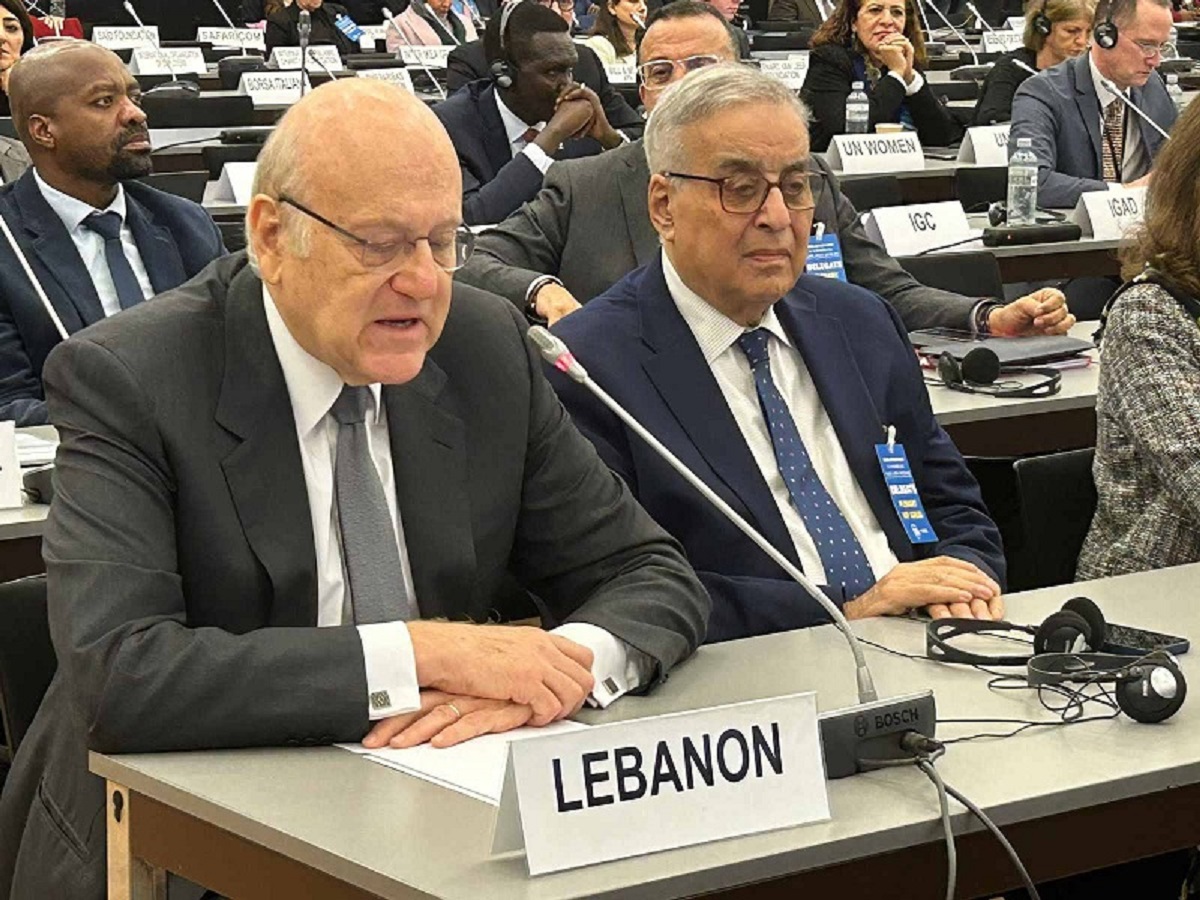
Caretaker Prime Minister Najib Mikati reaches the World Refugee Forum in Geneva to address Syrian displacement in the crisis-ridden country
Divided on many fronts – in the same days in which the Parliament is meeting to discuss the controversial issue of extending the mandate of the army chief, General Joseph Aoun -, when it comes to migration policies, Lebanon finds itself exceptionally united.
The observation came by caretaker Prime Minister, Najib Mikati, that on Wednesday, together with caretaker Minister of Foreign Affairs and Emigrants, Abdallah Bou Habib, reached the headquarters of the World Forum for Refugees in Geneva to represent Lebanon. Mikati highlighted the prioritarian importance of addressing the Syrian displacement crisis in the country, underlying Lebanon’s precarious position, that he defined at “the brink of total collapse,” yet surprisingly united in calling on the international community for the return of Syrian refugees to safe and stable areas.
This comes at a time when the vanity of the definition of ‘safe’ or ‘stable’ zones, for countries at war, is the most evident. The massive displacement to which the Israeli aggression forced the population of Gaza, pushing more than one million civilians towards southern areas, then bombing convoys of displaced people, hospitals, schools, and the very south of the besieged enclave – formally assured to be a safe zone -, showed in the eyes of the world the tragic irony of the concept of security in times of war.
Therefore, the undoubted and steadfast support for the Palestinian cause and its right to self-determination, which Mikati reaffirmed in Switzerland, predictably came along with a strong condemnation of Israeli policies and a renewed call for Palestinian refugees’ return under the protection of international law. Addressing Lebanon’s history of hosting Palestinian refugees, Mikati highlighted the country’s limited resources and called for prioritizing the resolution of the Palestinian-Israeli conflict as the key to addressing the region’s multiple crises: as expected, after having urgently and openly called to stop violence and protect Palestinian civilians in the Occupied territories.
However, this does not seem to apply to the Syrian people’s cause, oppressed by similar brutalities during their decade-long civil war by the hands of President Bashar al-Assad, currently under international arrest warrant for committing crimes against humanity.
Despite that, Mikati called upon the international community to focus on facilitating the return of Syrian refugees, providing aid within their homeland, ensuring voluntary returns, and prioritizing support and reintegration of Syrian refugees within Syria; additionally, he suggested a ‘scientific classification’ distinguishing between Syrian workers and displaced persons, in order to set a national mechanism to determine the legal status of each refugee in Lebanon, and ensure private sector employment conditions that “reduce competition with Lebanese professionals.”
Regarding Lebanon’s economic burdens, it is a shared sentiment among part of Lebanese society to blame the recent influx of Syrian migrants, often depicted as a threat to Lebanese society’s fabric and its sovereignty. Accused of affecting communal security, demographic balance, increased crime rates, and prison overcrowding, the Syrian refugee population consists of 1.5 million, three quarters of the overall refugee population in the country which has the highest demographic ratio of refugees to citizens: one every two, as figures from UNHCR show, demonstrating that Lebanon remains the country hosting the largest number of refugees per capita and per square kilometer in the world.
Expressing concern over new waves of Syrian displacement through illegal channels for primarily economic reasons, and soliciting the international community – particularly European countries – for the urgency of taking measures to prevent new attempts of illegal migration by sea, Mikati emphasized Lebanon’s determination to protect its homeland and its people’s right to live with “dignity and pride.” But if you look closer, you’ll see the decades-long burden that has been imposed on refugees, both Palestinian and Syrian, from the country that they desperately try to leave, often undertaking the deadly journey to the European coasts.
The fundamental and indisputable right, which seems to be dear to the Lebanese Prime Minister when it comes to Lebanese citizens or to the same Palestinian victims of Israeli brutality, seems to exclude the same refugees to whom – decades before the severe economic crisis, and with the excuse of preserving the right of return – concessions such as the right to work, with very rare exceptions; to public schooling; to health insurance; or to property, among others, have been denied, usually on a sectarian basis. It is not surprising, for example, that some Christian Palestinian refugees were granted Lebanese citizenship as early as the 1950s, during the presidency of Camille Chamoun, while it was largely denied to Muslims.
And while Lebanese politicians from all sides regularly call for the immediate legal and safe return of Syrian refugees – asserting that the security conditions allow for such a return, while the UN and other rights groups warn that this is not the case -, since 2023 a massive campaign of forced repatriation has been seriously threatening Syrians’ lives, unmasking the rhetoric of security, the voluntariness of return and the dignity of the person.








